Top Rankings
Poplarville Separate School District ranks among the top 20% of public school district in Mississippi for:
Category
Attribute
Science Proficiency
Highest science proficiency (Top 5%)
Graduation Rate
Highest graduation rate (Top 20%)
For the 2025 school year, there is 1 public preschool serving 494 students in Poplarville Separate School District.
Public Preschools in Poplarville Separate School District have a diversity score of 0.29, which is less than the Mississippi public preschool average of 0.60.
Minority enrollment is 17% of the student body (majority Black), which is less than the Mississippi public preschool average of 55% (majority Black).
Overview
This School District
This State (MS)
# Schools
5 Schools
282 Schools
# Students
1,923 Students
125,600 Students
# Teachers
139 Teachers
10,006 Teachers
Student : Teacher Ratio
15:1
15:1
District Rank
Poplarville Separate School District, which is ranked within the top 30% of all 148 school districts in Mississippi (based off of combined math and reading proficiency testing data) for the 2021-2022 school year.
The school district's graduation rate of 90-94% has increased from 85-89% over five school years.
Overall District Rank
#41 out of 148 school districts
(Top 30%)
(Top 30%)
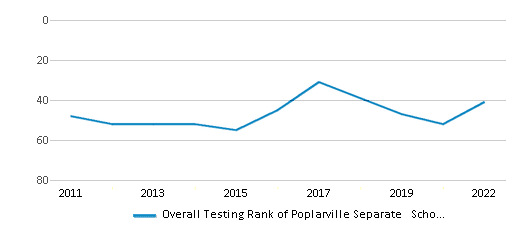
Math Test Scores (% Proficient)
49%
47%
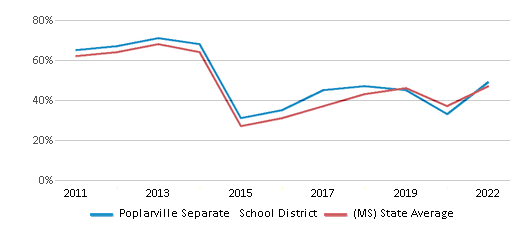
Reading/Language Arts Test Scores (% Proficient)
47%
42%
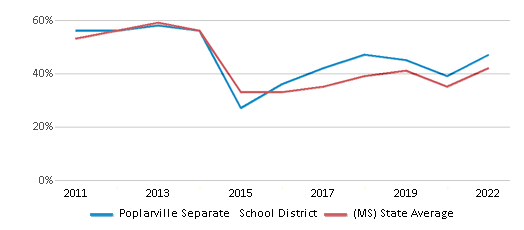
Science Test Scores (% Proficient)
76%
55%
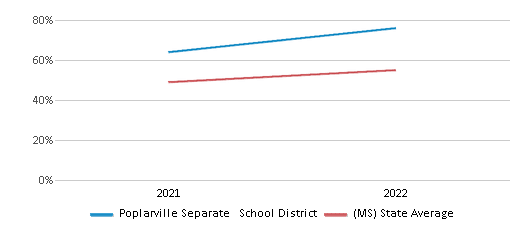
Graduation Rate
90-94%
89%
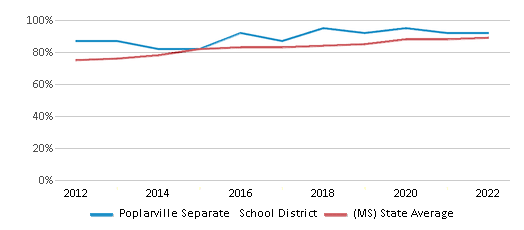
Students by Ethnicity:
Diversity Score
0.29
0.60
# American Indian Students
3 Students
282 Students
% American Indian Students
n/a
n/a
# Asian Students
5 Students
834 Students
% Asian Students
n/a
1%
# Hispanic Students
17 Students
5,432 Students
% Hispanic Students
1%
4%
# Black Students
167 Students
56,691 Students
% Black Students
9%
45%
# White Students
1,612 Students
55,982 Students
% White Students
84%
45%
# Hawaiian Students
2 Students
66 Students
% Hawaiian Students
n/a
n/a
# Two or more races Students
117 Students
6,313 Students
% of Two or more races Students
6%
5%
Students by Grade:
# Students in PK Grade:
19
9,221
# Students in K Grade:
149
22,360
# Students in 1st Grade:
146
22,172
# Students in 2nd Grade:
161
19,400
# Students in 3rd Grade:
127
14,702
# Students in 4th Grade:
140
13,066
# Students in 5th Grade:
143
10,676
# Students in 6th Grade:
144
4,243
# Students in 7th Grade:
172
1,742
# Students in 8th Grade:
133
1,709
# Students in 9th Grade:
157
1,025
# Students in 10th Grade:
135
986
# Students in 11th Grade:
153
953
# Students in 12th Grade:
101
827
# Ungraded Students:
43
2,518
District Revenue and Spending
The revenue/student of $10,852 in this school district is less than the state median of $12,205. The school district revenue/student has declined by 10% over four school years.
The school district's spending/student of $9,851 is less than the state median of $12,074. The school district spending/student has declined by 10% over four school years.
Total Revenue
$21 MM
$5,371 MM
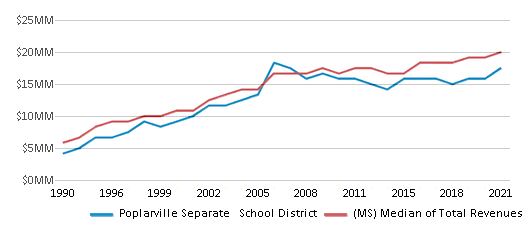
Spending
$19 MM
$5,314 MM
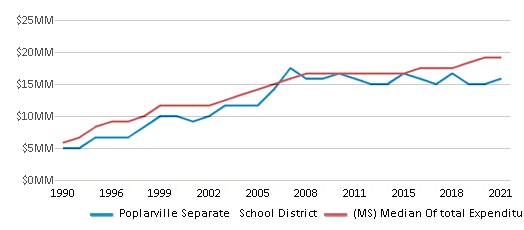
Revenue / Student
$10,852
$12,205
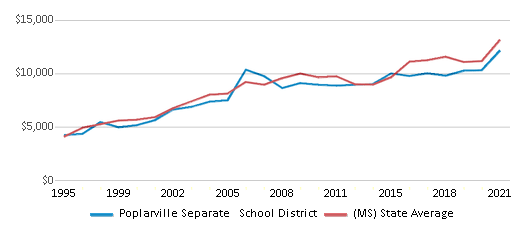
Spending / Student
$9,851
$12,074
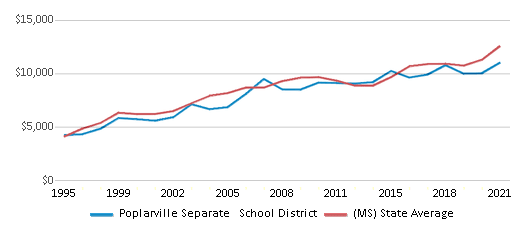
Best Poplarville Separate School District Public Preschools (2025)
School
(Math and Reading Proficiency)
(Math and Reading Proficiency)
Location
Grades
Students
Rank: n/an/a
804 South Julia Street Suite A
Poplarville, MS 39470
(601) 795-4736
Poplarville, MS 39470
(601) 795-4736
Grades: PK-2
| 494 students
Recent Articles

Year-Round Or Traditional Schedule?
Which is more appropriate for your child? A year-round attendance schedule or traditional schedule? We look at the pros and cons.

Why You Should Encourage Your Child to Join a Sports Team
Participating in team sports has a great many benefits for children, there is no doubt. In this article you will learn what those benefits are.

White Students are Now the Minority in U.S. Public Schools
Increasing birth rates among immigrant families from Asia and Central and South America, combined with lower birth rates among white families, means that for the first time in history, public school students in the United States are majority-minority. This shift in demographics poses difficulties for schools as they work to accommodate children of varying language abilities and socio-economic backgrounds.





